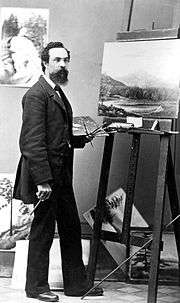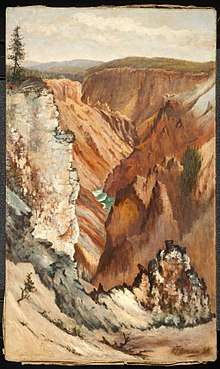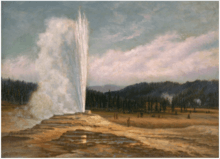Grafton Tyler Brown
| Grafton Tyler Brown | |
|---|---|
 | |
| Born |
1841 Harrisburg, Pennsylvania |
| Died |
1918 St. Peter, Minnesota |
| Nationality | American |
| Known for | Painter, lithographer, and cartographer |
Grafton Tyler Brown (1841–1918) was an American painter, lithographer and cartographer. Brown was the first African American artist to create works depicting the Pacific Northwest and California.[1]
Early life and education
He was born in Harrisburg, Pennsylvania.[1] His father was a freedman and was involved in the abolitionist movement. Brown worked for a printer in Philadelphia when he was fourteen. It was there where he learned the skill of lithography.[2]
Career

Brown moved to San Francisco in the 1860s. He worked as a lithographer before becoming known as a painter in the 1880s. In San Francisco, he worked at Kuchel & Dressel from 1861–1867. In 1867 he opened his own firm and in 1878 he created The Illustrated History of San Francisco, which consisted of 72 topographical images of the city.[1] Brown's work in the Bay Area and in the Nevada Territory included documentation of settlements, property sales, claims and city boundaries.[2]

The following year he sold his company. He left the Bay Area in 1882 and moved to Victoria, British Columbia. While there, he participated in the Amos Bowman Geological Survey. While participating in the survey, he served as draftsman and documented the Cascade Mountains. In 1884 he moved back to the United States and traveled throughout the northwest and west, painting such sites as Mt. Rainier. He lived in Portland, Oregon, painting landscapes and also traveling to Yosemite and Yellowstone National Park to paint.[1]
.jpg)
In 1893, Brown moved to Saint Paul, Minnesota. In St. Paul he worked again as a draftsman, this time for the United States Army Corps of Engineers and for the city of St. Paul's engineering department. He died in St. Peter, Minnesota[3] in 1918.[1]
Brown's works are held in the collections of the Oakland Museum of California,[4] Smithsonian American Art Museum,[5] and the Los Angeles County Museum of Art.[6]
Notable exhibitions
- Blacks in the Westward Movement, 1975, Anacostia Community Museum[7]
- Grafton Tyler Brown: Visualizing California and the Pacific Northwest, California African American Museum[8] and Walters Art Museum[9]
References
- 1 2 3 4 5 Joan Marter (20 January 2011). The Grove Encyclopedia of American Art. Oxford University Press. pp. 343–344. ISBN 978-0-19-533579-8. Retrieved 21 April 2012.
- 1 2 Dreck Spurlock Wilson (12 January 2004). African-American Architects: A Biographical Dictionary, 1865-1945. Taylor & Francis. pp. 105–109. ISBN 978-0-415-92959-2. Retrieved 21 April 2012.
- ↑ Amy Scott; Museum of the American West (1 October 2006). Yosemite: Art of an American Icon. University of California Press. pp. 195–. ISBN 978-0-520-24922-6. Retrieved 21 April 2012.
- ↑ "Grafton Tyler Brown". OMCA Collections. Oakland Museum of California. Retrieved 21 April 2012.
- ↑ "The Iron-Clad Mine". Collections. Smithsonian American Art Museum. Retrieved 21 April 2012.
- ↑ "View of Mt. Rainier, 1886". Collections. Los Angeles County Museum of Art. Retrieved 21 April 2012.
- ↑ ""Blacks in the Westward Movement," Anacostia Neighborhood Museum". 92-1782. Smithsonian Institution Archives. Retrieved 21 April 2012.
- ↑ "Grafton Tyler Brown: Visualizing California and the Pacific Northwest". Exhibitions. CAAM. Archived from the original on 14 March 2012. Retrieved 21 April 2012.
- ↑ de Pastino, Blake (7 April 2004). "Grafton Tyler Brown: Visualizing California and the Pacific Northwest". Arts. City Paper. Retrieved 21 April 2012.
External links
![]()
- Selections of nineteenth-century Afro-American Art, a Metropolitan Museum of Art exhibition catalog
- Grafton Tyler Brown, Smithsonian American Art Museum